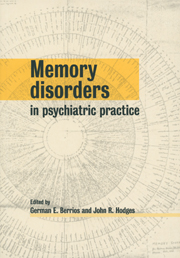Book contents
- Frontmatter
- Contents
- List of contributors
- Preface
- Part I
- Part II
- 6 The multidisciplinary memory clinic approach
- 7 The dementias
- 8 The amnesic syndrome
- 9 Transient global amnesia and transient epileptic amnesia
- 10 Insight into memory deficits
- 11 Memory in functional psychosis
- 12 Depressive pseudodementia
- 13 Practical management of memory problems
- Part III
- Notes
- Index
10 - Insight into memory deficits
from Part II
Published online by Cambridge University Press: 06 January 2010
- Frontmatter
- Contents
- List of contributors
- Preface
- Part I
- Part II
- 6 The multidisciplinary memory clinic approach
- 7 The dementias
- 8 The amnesic syndrome
- 9 Transient global amnesia and transient epileptic amnesia
- 10 Insight into memory deficits
- 11 Memory in functional psychosis
- 12 Depressive pseudodementia
- 13 Practical management of memory problems
- Part III
- Notes
- Index
Summary
In recent years increasing interest has been shown in the empirical study of insight and related notions in psychiatric and neurological/neuropsychological disciplines. In clinical psychiatry, insight has been explored predominantly in patients with psychotic illnesses, particularly schizophrenia (McEvoy et al., 1989; Amador et al., 1991, 1993; David et al., 1992). Insight in patients with affective disorders has received much less attention (Michalakeas et al., 1994; Ghaemi et al., 1996). The focus of these studies has been on the relationship between levels of insight and severity of psychopathology, compliance with treatment, prognosis, neuropsychological impairment, etc. The inconsistent results achieved so far are likely to result from differences in the methods of evaluation, these in turn reflecting diverse conceptualizations of insight (Marková & Berrios, 1995a). In general, recent views conceive of insight as a multidimensional concept including not only the patient's awareness of the symptoms/disease, but also elaboration of the said experience, variously conceptualized as, e.g. a correct attribution (Amador et al., 1991), a relabelling of symptoms as pathological (David, 1990), or a deeper knowledge of the effects of the symptoms/disease on the individual in the context of his/her environment (Marková & Berrios, 1992, 1995b).
In contrast to this broad conceptualization of insight in psychiatry, the neurological and neuropsychological disciplines have tended to conceive insight in the much narrower sense of awareness of specific deficits. Since the late nineteenth century, there have been reports of patients seemingly oblivious to major neurological deficit, maintaining their ‘unawareness’ and/or explicitly denying any disability in the face of confrontative evidence to the contrary (Anton, 1899).
Keywords
- Type
- Chapter
- Information
- Memory Disorders in Psychiatric Practice , pp. 204 - 233Publisher: Cambridge University PressPrint publication year: 2000
- 10
- Cited by

